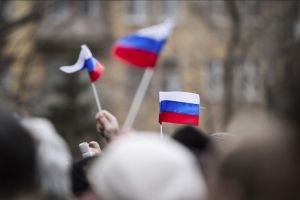Surveys of Russian and American public opinion by the Levada Center and Chicago Council on Global Affairs indicate the United States and Russia are more rivals than partners.
Introduction
US-Russia relations have been at odds since Russia annexed Crimea in 2014, and this current period of tensions is arguably the longest on record since the end of the Cold War.1 With potential links between the Trump administration and Russian interference in the 2016 elections looming in the background, the American public is not ready to forgive and forget. At the same time, Russians say their country is once again a force to be reckoned with and view chilled relations with the United States as a cost of increased international influence.
Key Findings
These are highlights from the February 2019 Chicago Council and Levada Center surveys:2
- Large majorities of Russians (85%) and Americans (78%) say the United States and Russia are more rivals than partners.
- In Russia, majorities believe that their country’s recent foreign policy has worsened relations with the United States (78%), Russia’s economic situation (58%), and Russian living standards (64%). But majorities also think it has improved the state of their military (83%) and their country’s influence abroad (62%).
- In the United States, public perceptions that Russia is a threat to US security have risen (from 18% in 2017 to 39% in 2019). Slightly more Americans now than two years ago believe that Russia tried to influence the 2016 US presidential election (66%, 61% in 2017).
- Russians continue to support the annexation of Crimea, saying it has brought more benefits (62%) than harm (16%) to Russia. For their part, a majority of Americans think the US response to Russian actions has been about right (49%) or not gone far enough (36%).
Methodology
The analysis in this report is based on data from a joint Chicago Council-Levada Analytical Center survey on Russian and American Attitudes conducted in February 2019.
The US survey was conducted by Ipsos Public Affairs using their national online omnibus service, KnowledgePanel™, between February 22-24, 2019 among a weighted national sample of approximately 1,016 American adults, 18 years of age or older, living in all 50 US states and the District of Columbia. The margin of error is ±3 percentage points.
The Russia survey was conducted between February 14-20, 2019 by the Levada-Center (Levada Analytical Center) with face-to-face interviews conducted among a representative sample of 1,613 persons aged 18 years and older, living in eight federal districts of the Russian Federation. Inside each district, the sample is distributed among five strata of settlements proportionally to the number of population living in them, 18 years of age or older. The margin of error is ±3.4 percentage points.
The 2019 and 2017 Chicago Council-Levada Analytical Center Joint Surveys on Russian and American Attitudes are made possible by the generous support of the Carnegie Corporation of New York.
- 1
Robert E. Hamilton, "The Reset that Wasn’t: The Permanent Crisis of US-Russia Relations," Geopoliticus, Foreign Policy Research Institute, December 14, 2018
- 2
his brief is based on coordinated surveys conducted by Dina Smeltz and Lily Wojtowicz of the Chicago Council on Global Affairs and Denis Volkov and Stepan Goncharov of the Levada Analytical Center in Moscow. The joint project on US-Russian public opinion about foreign policy issues was generously funded by the Carnegie Corporation.




